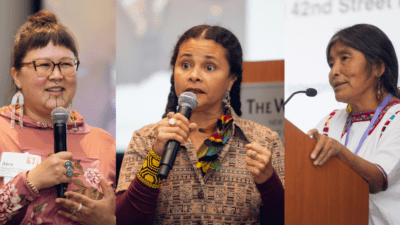In Brief
Millions of Americans in communities across the country face economic hardship and instability amid the COVID-19 pandemic, especially in areas of employment, housing, small business, access to capital and education. But in the South, where decades of structural racism and exclusionary practices and policies have marginalized communities of color, the disparities are disproportionately severe.
Why This Matters
Studies show that economic inclusion strategies – the intentional engagement by communities to implement strategies that expand the participation of businesses and people of color in the economy – are a superior growth model for communities because they harness untapped talent and economic potential, fostering prosperity for the entire community for generations to come. Our Business Case for Racial Equity report found that by 2050, when more than half of the population will be people of color, the U.S. economy could realize a $8 trillion gain in GDP by closing the racial equity gap. This is defined by lessening, and ultimately eliminating, disparities and opportunity differentials that limit the human potential and the economic contributions of people of color. The state of Mississippi stands to realize $54 billion and metro New Orleans stands to realize $43 billion in economic output in that time.
The Opportunity
Our grantee, the National League of Cities (NLC), just this month launched the Southern Cities Economic Inclusion (SCEI) initiative to support cities in building their capacity to implement economic inclusion strategies that close racial economic equity gaps through city-led strategies that expand economic opportunities for residents and businesses of color. As part of the SCEI initiative, municipalities will participate in peer learning cohorts that deepen capacity and build leadership skills while receiving technical assistance and innovation funding. Selected cities will represent various population sizes from target states: Alabama, Florida, Georgia, Louisiana, Mississippi, North Carolina, Tennessee and Virginia.
The initiative will be implemented in partnership with, and with support from, the Kellogg Foundation, the Annie E. Casey Foundation and the Federal Reserve Bank of Atlanta, and builds on previous work led by these organizations in a number of southern cities.
There is no better time to help cities center economic inclusion. As billions of dollars flow into communities from the American Rescue Plan Act (ARPA) and other federal programs, local governments are uniquely positioned to lead the country toward inclusive economies and prosperity. They can do this by embracing equity as a core operating principle and implementing policies and strategies to ensure that low-income people and communities of color can reach their full potential.
SCEI offers an extraordinary opportunity for municipalities to create transformational, sustainable and equitable systems change that offers its residents and businesses the greatest economic prosperity for generations to come.








Comments